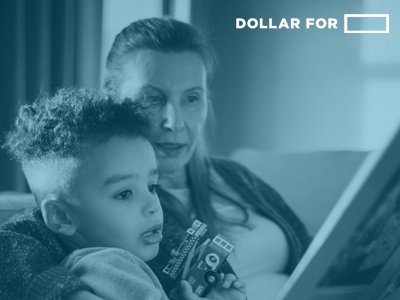With the Help of Technology, PAPs Tackle Affordability Barriers
Job losses and resignations spurred by the pandemic- coupled with escalating drug costs- have made it increasingly difficult for some patients to...
3 min read
 CareMetx
:
Oct 27, 2021 2:15:01 PM
CareMetx
:
Oct 27, 2021 2:15:01 PM

CareMetx is committed to helping patients overcome barriers to accessible and affordable specialty therapies. So when we met Jared Walker- founder of the nonprofit organization Dollar For- at the Healthcare Advocate Summit, we were especially excited to hear about his important work and how it aligns with our mission.
Based in Vancouver, Washington, Dollar For advocates for patients who face substantial medical debt, with a mission of “crushing medical bills” for those who can’t afford them. The idea sprung from a health crisis in Jared’s own family in 2012, leaving them with mounting medical bills.
“When someone has a medical crisis, they shouldn’t be forced to have a financial crisis at the same time,” Jared says, noting that medical debt often forces families into bankruptcy. “I wanted to help people with that financial piece, but I couldn’t find organizations in my area doing that work.” To fill the void, he launched a crowdfunding effort called Dollar For Portland. “People began making monthly donations to help pay medical bills for area patients,” he explains.
While the Portland crowdfund was successful, Jared recognized an opportunity to help on a larger scale. Since most hospitals are nonprofits, they are required by law to have financial assistance programs- called Charity Care- that forgive medical debt for patients who meet low-income requirements. Once patients are approved, they’re typically eligible for a period of about 6-12 months and can apply again once their approval expires. That’s especially good news for patients who need recurring specialty treatments.
At first glance, Charity Care sounds like a great solution to the medical debt problem; however, few patients are aware of this option. “The Charity Care requirement went into effect 10 years ago with the Affordable Care Act, but no one really talked about it,” Jared explains. Though hospitals must inform patients of their financial assistance policies, they often do so in the form of fine print on the back of a long, complicated medical bill.
Once Jared learned about the Charity Care requirement, the answer became clear: Launch a nonprofit that helps patients leverage these financial assistance programs to eliminate medical debt they can’t afford.
“I realized that for years, I was collecting crowdsourced money to pay medical bills for patients whose bills I could have just written off through these programs,” Jared says. Once he learned about the Charity Care requirement, he officially launched Dollar For as a nonprofit, and pivoted to educating patients about the hospital financial assistance they could tap.
“At first we just used word of mouth to tell people that these programs were available,” he continues. Simply by improving awareness, Dollar For helped patients eliminate about $1 million in medical bills in their first month alone- and that got Jared thinking bigger. “From there, we shifted our program to actively helping patients enforce these financial assistance policies,” he shares.
Through the organization’s Debt Forgiveness service, patients can now use a web-based tool to determine if they’re eligible for their hospital’s financial assistance program based on income and household size. Initially, the tool only included financial policy data for hospitals in Washington and Oregon. But once Jared filmed a TikTok video to help boost awareness, the video went viral- and patients from all over the US began reaching out for help.
@dollarfor #stitch with @420loveontour hospital bills are lame. Let’s take care of em! #fyp #legal #medicalbills #bills
♬ original sound - Dollar For
To meet the nationwide surge in demand, Dollar For organized a group of volunteers to collect financial policy data for every hospital in the country. “The tool now tells patients anywhere in the US if they’re eligible for their hospital’s Charity Care program,” Jared says. “And if they are, we help them complete all the necessary forms- because trust me, there are tons.”
Therein lies one of the biggest fundamental challenges of patient affordability and access: navigating piles of paperwork. As stakeholders throughout the healthcare industry are familiar, the many forms involved in applying for a financial assistance program or even determining patient eligibility for a therapy can be extremely complicated. If patients don’t complete the paperwork correctly—or worse, fail to submit it at all—they won’t have access to treatments that can enhance or save their lives.
Once patients use the Dollar For website to find out if their hospitals have Charity Care policies, they need to start the overwhelming task of applying. “Now they’re on the hospital’s website, looking through documents, printing 50 pages of paperwork, and trying to mail it all in,” Jared says. “It’s a lot to keep organized- all while going through a medical crisis.”
Worse, it is common for hospitals to respond to the initial application by requesting more information—which further reduces the odds that the patient will succeed in receiving help. According to Jared, about 90% of applications are denied simply because patients fail to fully complete them.
By helping individuals navigate complex Charity Care paperwork, complete their applications thoroughly, and submit them on time, Dollar For is making huge strides in eliminating medical debt for low-income patients. But as Jared’s experience shows, the cumbersome manual processes involved in today’s healthcare landscape are deeply threatening patients’ odds of accessing affordable healthcare.
Digital healthcare solutions that speed patient access to affordable treatments, coupled with the work of nonprofits like Dollar For, will continue to play a vital role in ensuring that patients can access the therapies their lives depend on, at the most affordable cost possible.
If you’d like to support the work of Dollar For, you can sign up to make a one-time or recurring donation. The organization is also looking to expand its patient advocate volunteer team and offers periodic virtual orientation sessions where you can learn more.

Job losses and resignations spurred by the pandemic- coupled with escalating drug costs- have made it increasingly difficult for some patients to...

Socioeconomic inequality continues to be one of the most pressing issues of our age, and one very specifically linked to health outcomes for...

At CareMetx, our personal and professional histories are the foundation for our corporate culture. Many of the individuals within our organization...